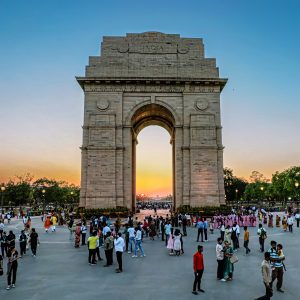What is behind ethnic violence in India’s northeast?
NEW DELHI (AA): India’s northeastern state of Manipur is reeling from ethnic violence which has affected thousands of people.
Sixty people have died in the unrest, while 231 people have been injured and around 1,700 houses burnt. In addition, 20,000 people have been taken to safe places, while work on shifting another 10,000 people to shelter camps is in progress.
A student who was stuck in Manipur shared that he is living in fear and hoping for a safe evacuation.
“I have not seen this kind of violence in my life. I cannot reveal how difficult it is for people like us who came to this state for studies. I just want to get out,” he said, requesting anonymity.
On May 4, the army was called in to assist law enforcement after a curfew was imposed in eight districts of Manipur following violence that erupted during protests against the inclusion of the Meitei community in the Scheduled Tribes category, giving them some special privileges.
What led to the violence?
The violence followed a Manipur High Court ruling on April 19 that directed the state government to submit recommendations for the inclusion of the Meitei community in the Scheduled Tribe category, which enraged the state’s tribal population. The Meitei people are the predominant ethnic group of Manipur.
A community granted Scheduled Tribe status is entitled to reserved seats in schools and government jobs. Because of existing laws, the Meitei community, which accounts for nearly 60% of the state’s population, is not permitted to settle in hilly areas.
Why are the tribes protesting?
The Naga and Kuki tribes people are concerned that if Maitei community is granted Scheduled Tribe status, their proportions in government jobs and land ownership will shrink.
According to the 2011 census, Manipur has a population of 2.8 million. There are three main communities living in the state: Meitei, Naga and Kuki.
Meitei are mostly Hindu. Nagas and Kukis are mostly Christians.
Of the 60 lawmakers in Manipur, 40 are from the Meitei community.
Meitei occupy only 10% of the state’s area. The remaining 90% of the hilly areas are inhabited by recognized tribes of the state.
‘Tribe status necessary to protect land, tradition and culture’
The Meitei community is demanding that they too be given the status of a tribe. The community approached the Manipur High Court for this. Their argument is that Meitei should be given status as a tribe for the protection of this community, their ancestors’ land, traditions, culture and language.
The Meitei are primarily settled in the Imphal Valley region of the state. The Meitei say they are being pushed out of the mountains, while those with tribal status can buy land in the already shrinking Imphal Valley. But the tribes are opposing the grant of tribe status to the Meitei community.
These tribes say that Meiteis are more in population and they also have dominance in politics. The tribes say that the Meitei community is not tribal. They have already got Scheduled Caste and Other Backward Class (OBC) reservation as well as economically backward class reservation.
The tribes say if the Meitei community is given tribe status then they will also be allowed to buy land on the hills.
Government response
Curfew was imposed in eight districts of the state after violence last week and mobile internet services were suspended in Manipur for five days. Indian Army troops were called in to maintain peace in the region.
An Indian military statement on Monday said over 100 columns of the army and Assam Rifles have been working tirelessly in order to significantly enhance the surveillance capability in the state. More than 10,000 soldiers have been deployed to control the violence in the state.
What’s next?
Independent Filmmaker Meena Longjam, who has been campaigning for peace in the region shared that it is important that democratic means are deployed.
“It is important for us now to sit together and acknowledge the mistakes and work towards healing and forgiveness,” said Longjam.
According to her, the state failed to act on time which resulted in such barbarism, killing of so many people and displacement of thousands of residents.
Meena said that it is important that the Meitei community should also be allowed to preserve their heritage and culture. “You cannot take everything from them,” she added.
Paojel Chaoba, a journalist based in Manipur, said that the government is responsible for the current situation in the state.
“This is the failure of the government. They failed to assess the situation and we can see what happened.
“The government is responsible for protecting the life and property of the people,” Chaoba said.
India is a religiously and ethnically diverse country which, under its current Hindu nationalist regime, is becoming increasingly prejudiced and discriminatory towards religious and ethnic minorities.







